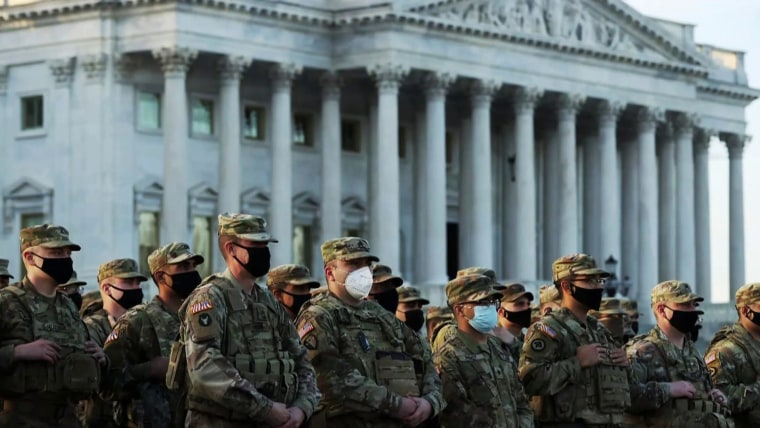WASHINGTON — The FBI is investigating whether foreign governments, organizations or individuals provided financial support to extremists who helped plan and execute the Jan. 6 attack on the Capitol, one current and one former FBI official told NBC News.
As part of the investigation, the bureau is examining payments of $500,000 in bitcoin, apparently by a French national, to key figures and groups in the alt-right before the riot, the sources said. Those payments were documented and posted on the web this week by a company that analyzes cryptocurrency transfers. Payments of bitcoin, a cryptocurrency, can be traced because they are documented on a public ledger.
Separately, a joint threat assessment issued this week by the FBI, the Department of Homeland Security and various other federal and D.C.-area police agencies noted that since the Jan. 6 riot, “Russian, Iranian, and Chinese influence actors have seized the opportunity to amplify narratives in furtherance of their policy interest amid the presidential transition.”
Russian state and proxy media outlets “have amplified themes related to the violent and chaotic nature of the Capitol Hill incident, impeachment of President Trump, and social media censorship,” the unclassified intelligence report said. “In at least one instance, a Russian proxy claimed that ANTIFA members disguised themselves as supporters of President Trump, and were responsible for storming the Capitol building.”
Chinese media, meanwhile, “have seized the story to denigrate U.S. democratic governance, casting the United States as broadly in decline — and to justify China’s crackdown on protestors in Hong Kong.”
The examination of possible foreign influence related to the Capitol riot, which involves the FBI’s Counterintelligence Division, comes after years of what current and former FBI officials say is mounting evidence that Russia and other foreign adversaries have sought to secretly support political extremists on the far right and far left.
Law enforcement officials and terrorism experts say there has long been “a mutual affection between Western white supremacists and the Russian government,” as two scholars put it in a February paper on the JustSecurity web site.
Some senators were concerned enough about the issue that they inserted a requirement in the 2021 defense bill that the Pentagon “report to Congress on the extent of Russian support for ‘racially and ethnically motivated violent extremist groups and networks in Europe and the United States’ — and what can be done to counter it.”
The current FBI official told NBC News that the bureau did not necessarily suspect Russian involvement in the bitcoin transfers, which appear to have been made by a French computer programmer who died by suicide on Dec. 8 after triggering the transfers, according to French media.
But the cryptocurrency payments prompted the FBI to examine whether any of the money was used to find illegal acts, which, if true, raises the possibility of money laundering and conspiracy charges, the FBI official said.
On Dec. 8, Chainalysis reported, the donor sent 28.15 BTC — worth about $522,000 at the time of transfer — to 22 separate addresses, many of which belong to far-right activists.
The Chainalysis blog post, first highlighted by Yahoo News, said far-right podcaster Nick Fuentes received the most money, 13.5 BTC — worth approximately $250,000.
Fuentes, who spoke at pro-Trump rallies last year in Michigan and Washington, D.C., told the ProPublica news organization that he was at the “Stop the Steal” rally on Wednesday but didn’t follow the mob into the Capitol.
One group of Fuentes’ supporters, which calls itself the Groyper Army, was filmed running through the Capitol carrying a large blue flag with the America First logo, ProPublica reported.
“We’re looking at and treating this just like a significant international counterterrorism or counterintelligence operation,” Michael Sherwin, the U.S. attorney in D.C., said at a news briefing last week.
“We’re looking at everything: Money, travel records, looking at disposition, movement, communication records.”


